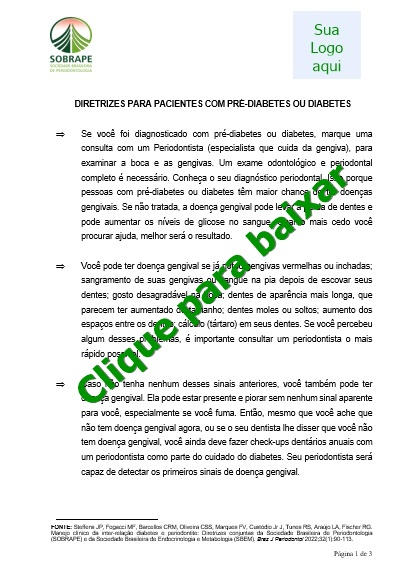The text below has been prepared by the Periodontal Medicine committee and is intended to provide objective, short and specific guidance to be distributed to patients.
The text is based on an article published jointly by SOBRAPE and SBEM(click here to see the article).
We recommend that you download the file in word format, add your logo, print it out and distribute it to your patients as a guide. To download the document, simply click on the image opposite and save. Then open it in the Word editor (MS) and attach your logo
- If you have been diagnosed with pre-diabetes or diabetes, make an appointment with a Periodontist (gum specialist) to examine your mouth and gums. A complete dental and periodontal examination is necessary. Know your periodontal diagnosis. This is because people with pre-diabetes or diabetes are more likely to have gum disease. If left untreated, gum disease can lead to tooth loss and can increase blood glucose levels. The sooner you seek help, the better the outcome.
- You may have gum disease if you have noticed red or swollen gums; bleeding from your gums or blood in the sink after brushing your teeth; an unpleasant taste in your mouth; longer-looking teeth that seem to have increased in size; soft or loose teeth; increased gaps between your teeth; calculus (tartar) on your teeth. If you've noticed any of these problems, it's important to see a periodontist as soon as possible.
- If you don't have any of the above signs, you may also have gum disease. It can be present and worsen without any signs being apparent to you, especially if you smoke. So even if you think you don't have gum disease now, or if your dentist tells you that you don't have gum disease, you should still have annual dental check-ups with a periodontist as part of your diabetes care. Your periodontist will be able to detect the first signs of gum disease.
- You may think you're managing your gum health well on your own, but you may not be doing enough because you have a higher risk of gum problems. Like diabetes, gum disease is a chronic condition and requires professional attention and care throughout your life.[2]
- You can prevent gum disease by having your teeth and gums professionally cleaned.
- Good oral hygiene, guided by your dentist, is an essential component of a healthy lifestyle, as are diet and physical activity.
- If you have diabetes, you should be on the lookout for other problems with your mouth besides gum disease, such as caries, dry mouth, burning in the mouth, fungal infections, or mouth sores that take a long time to heal.
- Remember to inform your periodontist about the outcome of your visits to the doctor and to provide an update on the results of achieving your therapeutic goals for diabetes care and changes in medication.
- It's important to keep your mouth and entire body as healthy as possible, with regular dental and medical care. Mouth and body health cannot be separated!
- If you have pre-diabetes or diabetes, remember that good blood glucose control prevents the onset of oral problems such as gum disease. Likewise, the results of treatment for these diseases are usually better when blood glucose is under control.
- It is essential to comply with medical recommendations so that blood glucose levels are achieved. To do this, follow the dietary guidelines, exercise regularly and take your medication at the correct doses and times.
SOURCE: Steffens JP, Fogacci MF, Barcellos CRM, Oliveira CSS, Marques FV, Custódio Jr J, Tunes RS, Araújo LA, Fischer RG. Clinical management of the interrelationship between diabetes and periodontitis: Joint guidelines of the Brazilian Society of Periodontology (SOBRAPE) and the Brazilian Society of Endocrinology and Metabology (SBEM). Braz J Periodontol 2022;32(1):90-113.



